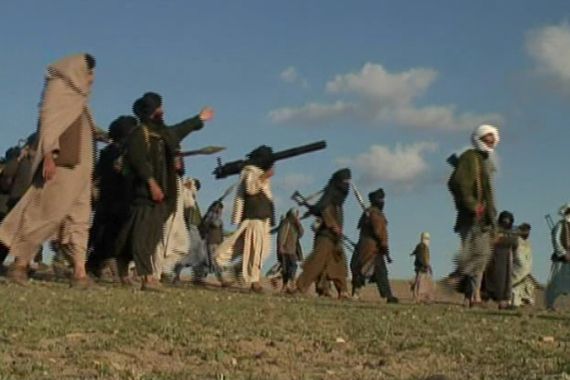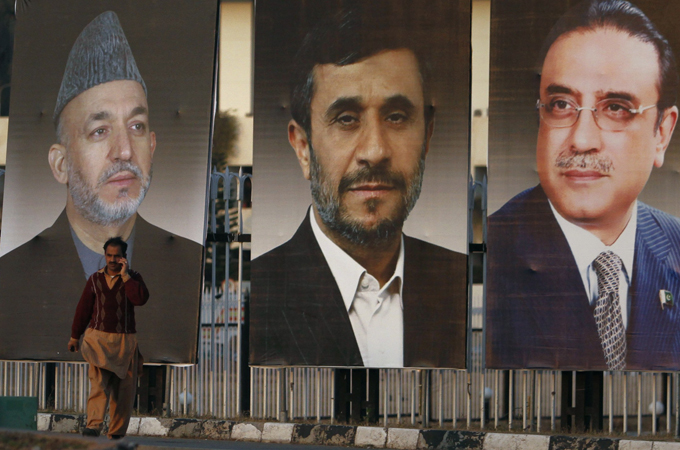Karzai confirms Afghan-US talks with Taliban
Afghan leader’s comments prompt Taliban to “strongly dismiss” the claim and denounce “puppet” Kabul government.

The US and Afghan governments have held three-way talks with the Taliban, Afghan President Hamid Karzai has said, prompting fierce denials from the Taliban.
In an interview to the Wall Street Journal on Thursday, Karzai declined to specify the location of the talks or go into further detail, saying he feared this could damage the process.
“There have been contacts between the US government and the Taliban, there have been contacts between the Afghan government and the Taliban, and there have been some contacts that we have made, all of us together, including the Taliban,” he said.
Zabiullah Mujahid, a spokesman for the Taliban, reacted in a statement on the group’s website by saying the Taliban “strongly dismiss” the claim made by Karzai.
Mujahid said no decision had yet been taken to hold talks with what he described as the “puppet” Kabul administration.
“People in Afghanistan want peace, including the Taliban. They’re also people like we all are. They have families, they have relatives, they have children, they are suffering a tough time,” the Wall Street Journal quoted Karzai as saying.
‘Exploratory’ talks
Soon after Karzai’s remarks were made public, the Afghan ambassador to Pakistan said the US and Afghan Taliban had made only “exploratory” contacts for possible reconciliation which did not involve the Kabul.
“I must emphasise that word ‘exploratory’. They are not talks,” Umar Daudzai told the Reuters news agency.
“When there’s talks, it’s supposed to be between the Afghan government and the Taliban. We have not reached to that stage although we wish to reach to that stage.”
Al Jazeera’s Bernard Smith, reporting from Kabul, said Karzai’s government had protested over being left out of recent talks between Washington and the group.
“The US is keen to present these as Afghan to Afghan talks, they want to see the Afghan government talking to the Taliban. The Afghan government had been previously worried that they would be left of the talks in Qatar, but now it seems that they have been represented there.”
Karzai’s remarks suggest progress in tentative peace efforts as the US and NATO begin withdrawing forces and prepare to transfer security responsibilities to Afghanistan by the end of 2014.
Karzai arrived in Islamabad, the Pakistani capital, on Thursday for meetings with government officials and his Iranian counterpart, Mahmoud Ahmadinejad.
Strained relations
Karzai’s office said the talks, which come amid strained relations between the Afghan and Pakistani governments, would focus on expanding relations, economic ties and “enhanced co-operation” on ending 10 years of war in Afghanistan.
Ahmadinejad flew into Islamabad in the afternoon for the trilateral meeting, scheduled on Friday to be followed by a joint news conference, Pakistan government officials said.
The talks were expected to focus on specific steps Islamabad can take to facilitate peace talks with the Taliban.
Pakistan, whose intelligence agency allegedly backs elements of the Taliban, says it will do what is required by Kabul to support an Afghan-led peace process, but there is a wide degree of scepticism in Afghanistan and the United States about its sincerity.
 |
|
Pakistan is hosting a trilateral summit [Reuters] |
In a statement last month, the Taliban said it would step up political efforts after Hillary Clinton, the US secretary of state, said that US talks with the group were still at a preliminary stage.
But it said it would not give up its armed struggle.
Speaking to Al Jazeera, Mirwais Yasini, a member of the Afghan parliament, said, “All sides including the US, Afghanistan and the Taliban must come to the point that there is no militancy, insurgency, suicide bombing, aerial bombardment. This [violence] is not the solution.”
Only a “tremendous decrease” in violence, Yasini continued, could bring all sides closer to “some sort of solution like power sharing or giving shelter to the Taliban in Afghanistan”.
In an exclusive interview with Al Jazeera, Abdullah Weqas, a Taliban commander in Afghanistan’s eastern Kunar Province, said that the group’s military campaign had forced the Americans to the negotiating table.
“The Americans didn’t want negotiations with us before, now they want to talk to us,” Weqas told Al Jazeera.
“The foreigners have suffered a lot of casualties here, that’s what persuaded them to talk. They have been shamed in front of the whole world; this is one of our successes.”
Secret meetings
US officials are believed to have held a series of secret meetings with the Taliban in Germany and Qatar since 2010, but those talks had to be suspended last December after Karzai objected to the process.
Our correspondent said the talks may become complicated since for many Taliban fighters there are certain issues not up for negotiation, including accepting the country’s constitution.
“If the current Taliban leadership is seen as giving way on issues like the constitution, the presence of foreign troops here, and the imposition of Sharia law, then there is a risk that a new hardline Taliban leader could emerge, and some of those foot soldiers will fall in behind him,” Smith said.
The efforts to talk to the Taliban have been criticized by many inside Afghanistan, who fear that the gains of the past decade might be compromised.
“We want the state to remain pluralistic, not bow to the barrel of a gun,” Amrullah Saleh, a former head of Afghanistan’s intelligence service and now a political opposition activist, said.
“If the Taliban, like us, want to come and play according to the script, sure. But if they come with gun-mounted Hi-Lux trucks, no, that means continuation of civil war, of war, and fragmentation of Afghanistan,” he said.